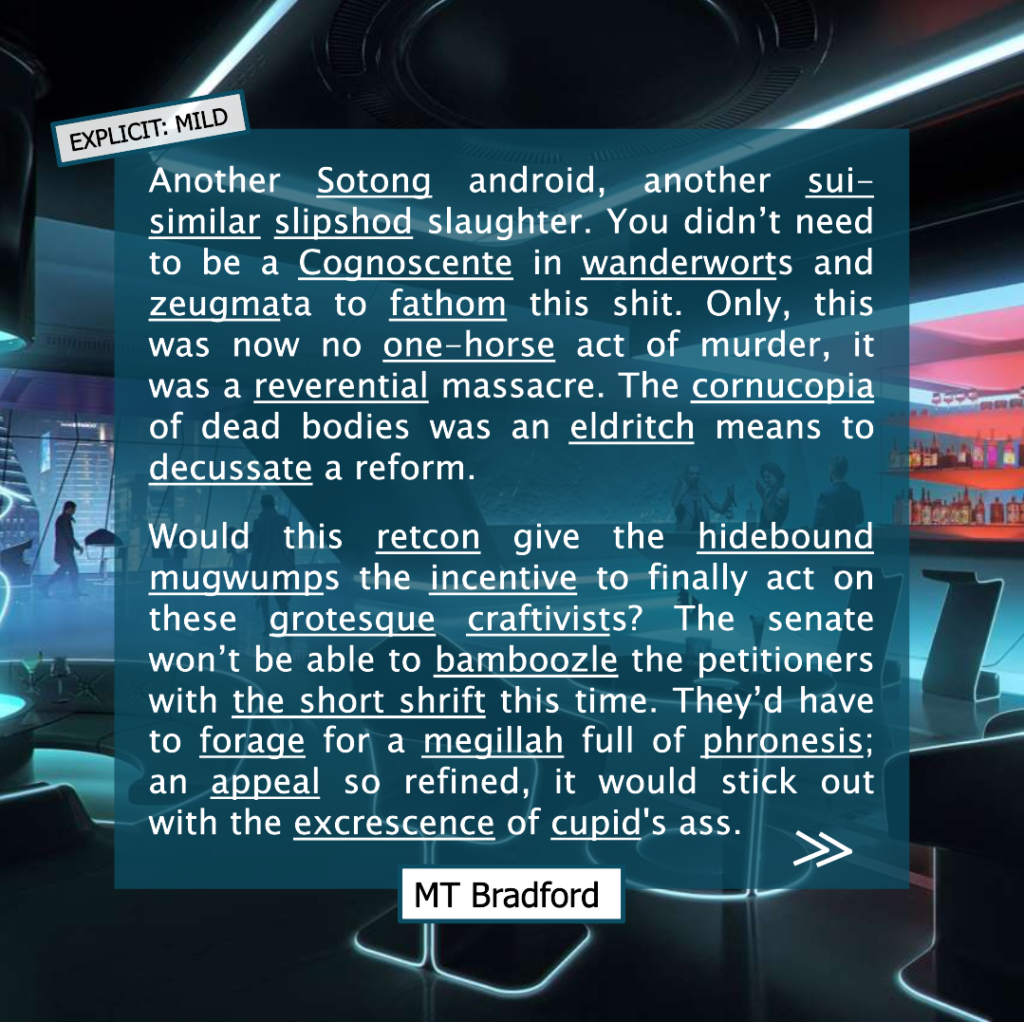

2021-02-28 #diceRollProse
Words of the week
Sotong (n): Singapore for dumbass.
Sui-similar (adj): having no variety or diversity.
Slipshod (adj): careless, untidy, or slovenly.
Cognoscente (n): persons who have superior knowledge and understanding of a particular field, especially in the fine arts, literature, and world of fashion.
Wanderwort (n): (linguistics) A word that traverses languages.
Zeugma (n): the use of a word to modify or govern two or more words when it is appropriate to only one of them or is appropriate to each but in a different way, as in to wage war and peace or On his fishing trip, he caught three trout and a cold.
Fathom (v).
One-horse (adj): small and unimportant; limited.
Reverential (adj): of the nature of or characterized by reverence; reverent.
Cornucopia (n): an abundant, overflowing supply.
Eldritch (adj): Ask H.P.Lovecraft.
Decussate (v): to cross in the form of an X; intersect.
Retcon (n): a subsequent revision of an established story in film, TV, video games, or comics.
Hidebound (adj): narrow and rigid in opinion; inflexible.
Mugwump (n): a person who is unable to make up his or her mind on an issue, especially in politics; a person who is neutral on a controversial issue.
Incentive (n).
Grotesque (adj): odd or unnatural in shape, appearance, or character; fantastically ugly or absurd; bizarre.
Craftivists (n): an activist who uses crafted to text to send a message.
Bamboozle (v): to deceive or get the better of (someone) by trickery, flattery, or the like; humbug; hoodwink (often followed by into).
Short shrift (n): little attention or consideration in dealing with a person or matter.
Forage (v).
Megillah (n): (slang) a lengthy, detailed explanation or account.
Megillah (n): (Hebrew) a scroll, especially one containing the Book of Esther. Others are the Book of Ecclesiastes, the Song of Solomon, the Book of Ruth, and the Book of Lamentations.
Phronesis (n): (philosophy) wisdom in determining ends and the means of attaining them.
Appeal (n).
Excrescence (n): any disfiguring addition.
Cupid (n): Also called Amor. the ancient Roman god of love and the son of either Mars or Mercury and Venus, identified with Eros and commonly represented as a winged, naked, infant boy with a bow and arrows.
Stats
Words: 102
Words-of-the-day: 26
Inclusion: 25%
Sentences with no words-of-the-day: 0
Most words-of-the-day in one sentence: 6
Nouns: 16
Adjectives: 7
Verbs: 4
Breakdown
Sui-similar slipshod slaughter, I invented a tongue twister. This prose I like. I was intrigued by craftivist from the get go and deliberately sought out a complimentary picture that exhibited graffiti or some artistic text. And with many formal words like reverential, incentive and appeal cropping up I felt a something political brewing.
It’s unclear who the protagonist is, but you, the reader, know that whoever they are, they are neutral to the political struggle ensuing. It would make sense for the protagonist to be one of the armed police investigating the bloody crime, as the tone of narration is informal, using words like shit and ass. But if it is a police officer, then they must be the most well educated cop in the land coming out with words like phronesis, cornucopia and decussate.
I’m particularly pleased by the grouping of cognoscente, wanderwort and zeugma. These three words-of-the-day came from different sources so I did well to conceive them into a theme. I think it’s fair to say that, only a cognoscente would know what a wanderwort and zeugma was in the first place.
Though it’s tough to follow, I do like how the second paragraph describes the political situation. You get the feeling their is a critical struggle underway and that this murder is pivotal in the matter. The protagonist talks about the senate bamboozling petitioners with the short shrift and how this latest killing is now a tipping point in what will probably unfold into a territorial war. The following sentence on a whole is pretty powerful, with the exception of forage which is a bit odd. In this context I was able to highlight the stark opposites of the short shift and megillah. Emphasising the U-turn the senators would have to make with a level of wisdom (phronesis) in order to maintain the peace the way they wanted.
I am satisfied every prescribed word is doing it’s job right. However, the vocabulary is possibly a bit much even for #diceRollProse standards. I don’t think even the dean of Classical English at Oxford University would confabulate like this. Also the first sentence of paragraph two feels like a different person talking; someone distinctly American with the use of retcon, mugwumps and hidebound to some extent. Although the more I think about it, a super intellectual, underrated cop might make a good character.
Another thing I’m still iffy about is the contradiction between sui-similar and retcon. The latter is a term used to describe a shift in plot, something that makes an audience review all the facts they previously understood to be true in a story. Where as sui-similar is a term to describe something as identical as all previous instances of it. So if this murder was sui-similar, what possible revision could there be to make a retcon impactful at all? It could be the retcon is related to a series of factors of which these murders are included? What do you think?
Art
No Robots Allowed by The Friendly Robot
